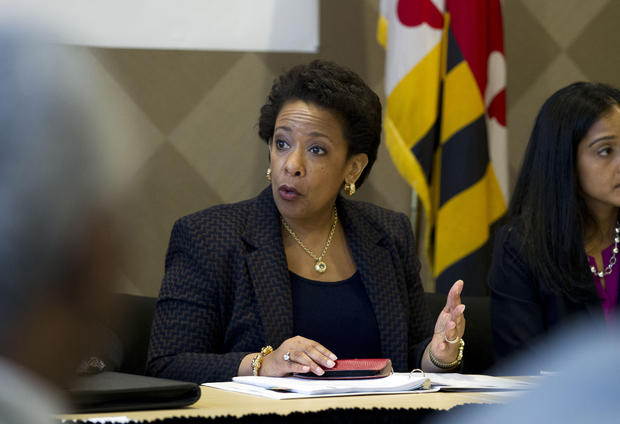Loretta Lynch on race, family and facing adversity
On the first day of her job, Attorney General Loretta Lynch was tasked with briefing the president on race riots in Baltimore, reports "CBS This Morning" co-host Norah O'Donnell.
"People have asked me about that. And they've said, you know, 'You immediately had to deal with Baltimore,'" Lynch said. "That's true, but people in Baltimore have been dealing with those issues for years."
It hasn't just been Baltimore though. Incidents in Ferguson, Cleveland and North Charleston have all brought about a discussion of race in America.
"I think what you have seen in some cities and the resulting publicity, has highlighted instances of tension and frustration and negative relationships that have gone on for a while," Lynch said. "And you'll talk to community leaders who will say, 'We've been telling you this for years. But no one was listening.' So it's hard to say whether it's a new phenomenon or we're just paying more attention to it."
She said it's clear there are still race issues in the U.S.
Loretta lynch grew up in North Carolina, surrounded by the issue of race. Her grandparents were sharecroppers. Her father was a minister and civil rights leader. Her mother, she said, had a backbone of steel in the segregated south.
"Before we were even born, she would tell me that my dad, who would go from church to church, doing revivals or meetings, would stop. They would drive sometimes through the night or in the evenings to get to various places," Lynch said. "She had to stop and use the restroom. And she'd go to these small rural gas stations and she just would refuse to use the colored restroom. And she said she just got to a point where she decided she wasn't gonna do it anymore."
She credits her mother for teaching her it's possible to make a difference -- very quietly.
"It's the choices that you make and the things that you're willing to accept and not accept that define who you are. For her, I don't think it was really a major moment. I think she just looked at the situation and said, 'This isn't right and I'm just not gonna do it anymore. This is not the America that I was brought up to believe in. And it's not the America that I want to raise my children in,'" she said.
Lynch went on to become her high school valedictorian and a Harvard Law graduate. She eventually became a prosecutor in New York.
But from the beginning she faced adversity. As a young lawyer, people mistook for a court reporter.
"I think many a young female lawyers had that experience; going into the deposition and people thinking that you're the court reporter," she said.
Lynch said you can't control what others think about you.
"Others will always seek to define you based on what they think you represent or who they think you are. But you have to be the one to control what you do and what you say and how you present yourself," she said.
It's a feeling shared by many Americans with regards to how they're perceived by police.
"I think a lot of young black people feel that way. Many older black people may feel that way as well," she said.
But according to Lynch, police officers share a similar sentiment.
"One of the ironies of this entire debate is when I talk to police officers about their concerns, they, too, talk about how they feel that people don't see them as individuals. They see the uniform first and not a person. And when I point out, 'You know, that's the same thing that a lot of protesters are saying,' There's often this moment of rather startled recognition. But people really are saying the same thing. Everyone wants to be seen. Everyone wants to be heard. Everyone wants to be recognized as the person that they are and not a stereotype or an image."
